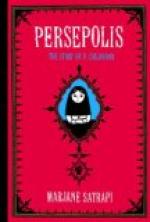No one knew it. He as little as any. No one knew it. Only indeed Patrasche, who, being with him always, saw him draw with chalk upon the stones any and every thing that grew or breathed, heard him on his little bed of hay murmur all manner of timid, pathetic prayers to the spirit of the great Master; watched his gaze darken and his face radiate at the evening glow of sunset or the rosy rising of the dawn; and felt many and many a time the tears of a strange nameless pain and joy, mingled together, fall hotly from the bright young eyes upon his own wrinkled, yellow forehead.
“I should go to my grave quite content if I thought, Nello, that when thou growest a man thou couldst own this hut and the little plot of ground, and labor for thyself, and be called Baas by thy neighbors,” said the old man Jehan many an hour from his bed. For to own a bit of soil, and to be called Baas—master—by the hamlet round, is to have achieved the highest ideal of a Flemish peasant; and the old soldier, who had wandered over all the earth in his youth, and had brought nothing back, deemed in his old age that to live and die on one spot in contented humility was the fairest fate he could desire for his darling. But Nello said nothing.
The same leaven was working in him that in other times begat Rubens and Jordaens and the Van Eycks, and all their wondrous tribe, and in times more recent begat in the green country of the Ardennes, where the Meuse washes the old walls of Dijon, the great artist of the Patroclus, whose genius is too near us for us aright to measure its divinity.
Nello dreamed of other things in the future than of tilling the little rood of earth, and living under the wattle roof, and being called Baas by neighbors a little poorer or a little less poor than himself. The cathedral spire, where it rose beyond the fields in the ruddy evening skies or in the dim, gray, misty mornings, said other things to him than this. But these he told only to Patrasche, whispering, childlike, his fancies in the dog’s ear when they went together at their work through the fogs of the daybreak, or lay together at their rest amongst the rustling rushes by the water’s side.
For such dreams are not easily shaped into speech to awake the slow sympathies of human auditors; and they would only have sorely perplexed and troubled the poor old man bedridden in his corner, who, for his part, whenever he had trodden the streets of Antwerp, had thought the daub of blue and red that they called a Madonna, on the walls of the wine-shop where he drank his sou’s worth of black beer, quite as good as any of the famous altar-pieces for which the stranger folk travelled far and wide into Flanders from every land on which the good sun shone.




